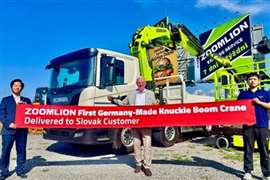Digging for Ukraine: Volvo’s battle to get women to operate excavators and wheel loaders
08 October 2024
Until 2017, females in Ukraine were banned from operating heavy construction equipment. Now, with the country at war against Russia, the government is working with Volvo CE and partners to bring record numbers into the industry via an accelerated course to help women qualify as excavator and wheel loader operators. Lucy Barnard reports.
“We are not afraid,” Anastaysia Marienskova, a manager at Ukrainian construction equipment dealer ETS says simply. “Ukrainian women are not afraid.”
 Photo: Volvo CE
Photo: Volvo CE
Marienskova speaks for a generation of Ukrainian women who are bracing themselves for a third winter of war in a campaign which has already claimed thousands of lives, displaced millions and inflicted untold suffering.
Since the start of hostilities in February 2022 significant numbers of women have joined the Ukrainian armed forces while millions more are stepping in to take up jobs traditionally held by men such as driving trucks, mining, working in steel mills or on the railways.
And now, Marienskova says women can play a key role in the vast amount of construction work.
Certainly, the need for more construction workers to help repair Ukraine’s fragmented infrastructure is clear.
According to analyses of satellite imagery, an estimated 70% of energy infrastructure and 30% of transport as well as at least 210,000 buildings across the country have been destroyed by the fighting.
Ukraine’s shortage of construction workers
And with most working age men in the country conscripted into the military, Ukraine’s construction industry is desperate for workers.
According to the Confederation of Employers in Ukraine, the number of officially registered workers in the sector has fallen by a quarter to just 300.000 people, with some looking to recruit migrant workers from as far afield as Pakistan, Nepal, India, Bangladesh and the Philippines to fill the gap.
Ukraine’s Economy Ministry has been working with corporates, charities and training firms to make it easier for women to get the skills and qualifications necessary to take on these sorts of jobs.
 Photo: Volvo CE
Photo: Volvo CE
One of these has been an agreement with ETS, together with Volvo Construction Equipment and Sweden-based charity Beredskapslyftet, to accredit an accelerated construction machinery operator course, specifically aimed at women which enables them to complete the necessary training in just nine weeks – rather than the nine months taken by traditional Ukrainian machine operator courses.
“These days it is really important to develop our country,” says Marienskova. “This course makes it possible to rebuild for Ukraine and give people a new stable job. Customers have been telling us they have a severe lack of operators. They are asking us to help and to train more. Now anyone who passes the exam can get a government certificate and work as an operator.”
For a country where, just a few years ago women were prevented from operating excavators by law, it’s a massive change.
Repealing Soviet-era legislation
In 2017 the Ukrainian government repealed Soviet-era legislation which banned females from 450 professions considered to be damaging to women’s reproductive health which included many construction jobs including carpentry, welding and operating excavators. In fact, before the Russian invasion, fewer than half of all adult Ukrainian women had a job – one of the lowest rates in Europe.
“Our goal for now, first of all is to introduce the profession to women,” says Marienskova. “It’s not normal in Ukraine for women to operate a wheel loader or excavator. Normally it’s a profession for men.”
Initially, the course leaders plan to launch a pilot course for just 12, but they hope to have trained at least fifty operatives by the end of 2024.
 Anastasia Marisenkova, program lead at ETS Group. Photo: Volvo CE
Anastasia Marisenkova, program lead at ETS Group. Photo: Volvo CE
The course starts with four weeks of remote learning over Teams and followed by another four weeks of face-to-face education.
Participants will clock up 40 hours of time in the cab of both a Volvo excavator and wheel loader before then taking a week-long practical assessment which, if they pass, provides them with a government approved license.
Students will receive free tuition costs as well as accommodation and meals for the in-person portion of the course. And, in the event of any Russian shelling they will have access to a suitable bomb shelter.
Marienskova says that so far the response has been positive.
“We only announced this initiative a few days ago and we’ve already had more applicants than we can educate both this year and next year,” she says.
Dubbed ‘Iron Women’ the programme borrows extensively from an initiative set up by Volvo CE’s sister company Volvo Trucks in 2016, which has provided truck driving training to women in countries including Peru, South Africa and Ukraine.
Joakim Arndorw, head of region international at Volvo CE, who is steering the project on behalf of the manufacturer, hopes to roll the programme out to other countries around the world.
“In general, there is a shortage of skilled construction equipment operators more or less everywhere in the world,” he says. “We have looked at where it could be interesting to do this elsewhere in the world. We’re looking at this in dialogue with our dealers to see where there is potential.”
Iron women around the world
“The Volvo Trucks programme is about getting a truck driving license, so the course is much shorter,” he says.
 Joakim Arndorw, Head of Region International at Volvo Construction Equipment. Photo: Volvo CE
Joakim Arndorw, Head of Region International at Volvo Construction Equipment. Photo: Volvo CE
“This is the first time we are piloting the programme for construction equipment operators, so we are observing it now to ensure that we get the interest and whether we need to make any adjustments to the course.
According to the Bureau of Labor Statistics, women account for just 2.3% of ‘operating engineers and other construction equipment operators’ in the USA. In other countries the figure is likely to be even lower.
Arndorw says that the time and cost of qualifying to operate heavy construction equipment around the world varies significantly.
He points out that in Sweden where the course is offered as part of vocational training in high schools, fees are paid by the taxpayer while in other countries the cost can run into thousands of US dollars.
“This initiative wakes up to the fact that construction is still very male dominated and says its not only for men – women can do this too,” he says.
STAY CONNECTED


Receive the information you need when you need it through our world-leading magazines, newsletters and daily briefings.
CONNECT WITH THE TEAM












